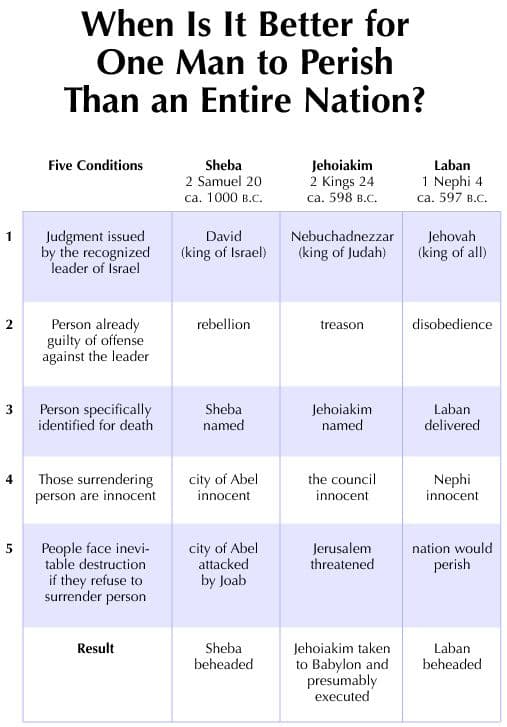
Share
When Is It Better for One Man to Perish Than an Entire Nation?

Title
When Is It Better for One Man to Perish Than an Entire Nation?
Publication Type
Chart
Year of Publication
1999
Authors
Welch, John W. (Primary), and Welch, Greg (Primary)
Number
9-115
Publisher
Foundation for Ancient Research and Mormon Studies
City
Provo, UT
Share
Abstract
The Spirit told Nephi that the Lord had delivered Laban into Nephi's hands and that it was better for Laban to die than for an entire nation to perish because of unbelief (see 1 Nephi 4:11–13). Though this case is extremely rare, ancient Israelite law authorized the slaying of a particular man at least two other times. This chart compares Nephi's situation with two similar incidents found in the Bible: the beheading of the rebel Sheba and the execution of King Jehoiakim. Five conditions were present in each of these instances: The (1) recognized leader of Israel pronounced judgment upon a (2) specifically named person (3) guilty of some form of rebellion or disobedience that (4) would result in the destruction of at least part of Israel (5) unless the innocent people turned the traitor over for execution. Under these special circumstances, the law sanctioned the death of one instead of requiring innocent people to perish or be destroyed.
Subject Keywords
Laws
Legal
Laban
Nephi (Son of Lehi)
Bibliographic Citation
Terms of use
Items in the BMC Archive are made publicly available for non-commercial, private use. Inclusion within the BMC Archive does not imply endorsement. Items do not represent the official views of The Church of Jesus Christ of Latter-day Saints or of Book of Mormon Central.